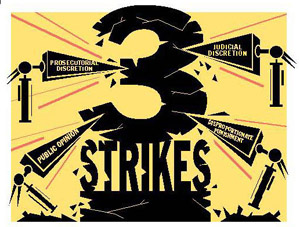|
|
|
|

Westlaw
|
 |
| Court
rulings, public opinion chip away at 'Three Strikes' |
 |
By
KRISTINA HORTON-FLAHERTY
Staff Writer |
 |
|
 They
all landed on the wrong side of California's "three strikes and you're
out" law. One wound up in prison for 50 years to life for twice shoplifting
videotapes from Kmart. Two others - one convicted of stealing a $25 steering
wheel alarm, the other for shoplifting $43 worth of videotapes - were sent
away for 25 years to life. They
all landed on the wrong side of California's "three strikes and you're
out" law. One wound up in prison for 50 years to life for twice shoplifting
videotapes from Kmart. Two others - one convicted of stealing a $25 steering
wheel alarm, the other for shoplifting $43 worth of videotapes - were sent
away for 25 years to life.
But in two decisions just months apart, the U.S. Ninth
Circuit Court of Appeals ruled recently that all three prison sentences -
despite the defendants' prior criminal records - amount to cruel and
unusual punishment. Even the violent prior offenses in two of the cases did not
justify 25 years to life in prison for petty theft, the court concluded in
February.
"This is a big green light for challenging excessive
sentences for minor offenses that are being sentenced under the three strikes
law," said Loyola law professor Laurie Levenson.
The opinions - the first issued in November, the second
in February - thrust the three strikes law back into the public spotlight,
reignited debate, prompted hundreds of hopeful prisoners to contact attorneys
and gave momentum to campaigns seeking to narrow the law's net.
University
of Southern California law professor Erwin Chemerinsky, who represented all
three defendants, applauded the court's latest ruling. "The Ninth Circuit
here says that the punishment has to be proportionate to the crime for which
the person is being sentenced," he said. "This case, as it stands, means
|
See
COURTS, PUBLIC |
|
| Whither
the Conference of Delegates? |
 |
By
NANCY McCARTHY
Staff Writer |
 |
|
Despite a prickly relationship in recent years, the State
Bar and its sometimes controversial Conference of Delegates have begun taking
friendly steps toward resolving their differences, moves that may well lead to
a separation.
Following a meeting at which both sides were surprised to
find they agreed that something has to change, the conference is trying to
create a series of proposals or models by the end of this month.
The
goal, said Starr Babcock, a bar executive serving on a special 10-person task
force looking at the future of the conference, is for the group to establish
its own legal independent status and to contract with the bar for limited
services. "They'll come to us with proposals to provide them with the
independence they need and provide us with the insurance we need that we
won't be held politically
|
See
CONFERENCE |
|
| Board
adopts strategic plan |
|
In an effort to more effectively meet the expectations of
the public, its members, other justice system partners, and other branches of
government, the State Bar Board of Governors recently adopted an interim
strategic plan to help it operate better.
It approved goals and strategies for dealing with six
long-range issues: admission, regulation and discipline; member services; equal
access to justice; stakeholder relations; leadership and accountability; and
technology.
The board hopes that an ongoing strategic planning process
will help it meet its public service goals and responsibilities. It will review
the strategic plan at its May meeting.
The strategic plan is an outgrowth of a movement toward
better governance and planning which began in October 2000, when the board
voted as its top priority to review its governance structure and to develop a
strategic plan and planning process. The following year, the state auditor
pointed to the need for more strategic planning, a need the chief justice and
Administrative Office of the Courts also have suggested.
The full text of the strategic plan can be found on the
bar's web site, www.calbar.org.
|
|
| Bar
petitions Supreme Court to save evidence in discipline case |
 |
By
NANCY McCARTHY
Staff Writer |
 |
|
The State Bar has asked the Supreme Court to allow it
access to suppressed evidence in the case of a Sacramento attorney the bar is
investigating for possible discipline even though criminal charges against him
were dismissed.
In an unusual petition in which the bar is bypassing the
court of appeal, its lawyers said a Sacramento Superior Court ruling that they
could not use illegally obtained evidence impairs the bar's ability to
discipline its members and in turn undermines the Supreme Court's authority
to regulate the practice of law. The bar went directly to the high court
because it holds that authority.
The
lower court's denial last year of the bar's petition to preserve the
evidence "will impair [the Supreme
|
See
BAR ASKS COURT |
|

